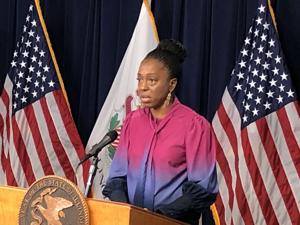Complaint seeks revocation of IDPH director’s medical license over COVID-19 ‘deceit’

(The Center Square) — A legal action group is requesting a state medical board revoke the medical license of Illinois’ top doctor – Dr. Ngozi Ezike – over the state’s handling of the COVID-19 pandemic.
Justin Mahwikizi, executive director of The American Institute of Action, requested the Medical Disciplinary Board conduct an investigation into Ezike’s medical license, in a letter to the Illinois Department of Financial and Professional Regulation’s Division of Professional Regulation Complaint Intake Unit.
Mahwikizi is seeking revocation of Ezike’s license.
“The Doctor Engaged in dishonorable, unethical or unprofessional conduct of a character likely to deceive, defraud or harm the public,” the seven-page letter states.
As the Director of the Illinois Department of Public Health, Ezike “was in charge of mounting a response to the COVID-19 response, working with Governor [J.B.] Pritzker,” the letter said, “acting under the color of law … to willfully deprive a person of a right or privilege protected by the Constitution or laws of the United States.”
Messages seeking comment from the Illinois Department of Public Health were not immediately returned.
The governor’s office also didn’t immediately respond to a request for comment.
IDFPR’s website states “all information collected by the Department during an examination or investigation of a licensee, registrant, or applicant is confidential and cannot be publicly disclosed.”
“This includes complaints and any information collected during an investigation,” according to the website. “Exceptions to this law exist only for law enforcement, other regulatory agencies with appropriate regulatory interest, or a party presenting a lawful subpoena.”
The complaint letter American Institute of Action released included dozens of pages of exhibits featuring news articles and internal emails obtained via the state’s Freedom of Information Act.
The letter highlights April 19, 2020, when Ezike said COVI-19 deaths are classified as “anyone who passes away after testing positive for the virus is included in that category,” and “even if you died of a clear alternate cause, but you had COVID at the time, it’s still listed as a COVID death.”
On May 9, the letter claims an internal email about COVID-19 testing reliability, said: “these numbers should not be used to determine policy.”
A Jan. 13, 2021 email from an IDPH attorney showed the administration was unable to identify records about the virus’ cycle quantification value to confirm positive cases.
The letter said “a Disciplinary Board composed of a majority of physicians deciding to not take any action against Dr. Ezike also standardizes her conduct and indiscretion in the evidence provided to be the gold standard for all other physicians in Illinois. The public should then expect other Physicians to use a diagnosis standard like the one Dr. Ezike used in classifying Covid deaths.”
“This would lead to further decline in trust in public health practitioners,” the letter said. “Should the public question a Doctor’s motivation behind every diagnosis of cancer? Heart disease? Diabetes? Autism? Does the oath matter anymore?”
“Regardless of any empathy the distinguished medical professionals who seat on this Disciplinary Board may have for the extenuating circumstances that Dr. Ezike was under in 2020; The Board cannot negate the serious charge they have to protect the integrity of the medical profession in Illinois,” Mahwikizi said in his letter. “The Board is bound by the rules it promulgates, and must adhere to them.”
Mahwikizi is also suing the governor in a pending case challenging the executive’s emergency powers.
A brochure about the complaint process from IDFPR states once a complaint is received, it’s forwarded to an investigative unit. The complaint committee may refer a complaint to a prosecution unit where a formal hearing before an administrative law judge could be held. From there a judge may make a recommendation after hearing from the physician and the prosecution division. That recommendation is then reviewed by the disciplinary board, with a recommendation sent to the Director of the Division. The Director of the Division would then decide the final order.
The governor appoints members of the Medical Disciplinary Board.
Disclaimer: This content is distributed by The Center Square

